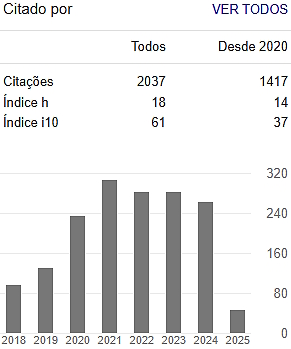AVALIAÇÃO SOBRE A REDUÇÃO DA ATIVIDADE MICROBIANA NA ADUBAÇÃO ORGÂNICA E SUA INFLUÊNCIA NO CRESCIMENTO DO MILHO E RESPIRAÇÃO DO SOLO
Resumo
O objetivo do presente trabalho foi avaliar o efeito da incorporação de matéria orgânica natural e matéria orgânica irradiada ao solo, sobre o crescimento do milho e respiração do solo. O experimento foi conduzido em casa de vegetação e laboratório de microbiologia. Para a adubação orgânica foi utilizado esterco bovino curtido retirado da fazenda de produção de leite. Para redução da atividade microbiana no esterco utilizou-se a técnica da irradiação utilizando-se o forno micro-ondas. O delineamento experimental empregado foi de blocos inteiramente casualizados contendo cinco tratamentos, com e sem irradiação e quatro repetições. Com 65 dias após a semeadura, foram feitas as avaliações da altura e massa seca de plantas. Foi também realizada a coleta de amostras de solo para a avaliação da atividade microbiana pelo método da respiração basal do solo. A aplicação do esterco natural favoreceu a maior atividade microbiana no solo quando comparada a mesma matéria orgânica esterilizada. O esterco natural promoveu o maior crescimento do milho indicando doses próximas de dez toneladas por hectare com ajuste quadrático significativo, o que não ocorreu no uso do esterco irradiado que proporcionou ajuste linear.
Downloads
Downloads
Publicado
Edição
Seção
Licença
Copyright (c) 2019 Colloquium Agrariae. ISSN: 1809-8215

Este trabalho está licenciado sob uma licença Creative Commons Attribution-NonCommercial-NoDerivatives 4.0 International License.

